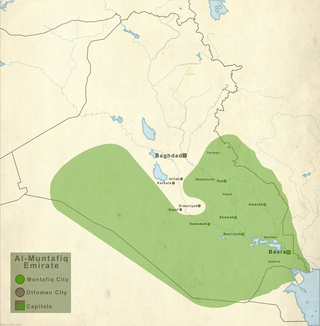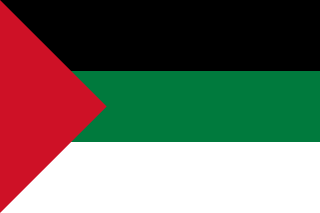
Karbala or Kerbala is a city in central Iraq, located about 100 km (62 mi) southwest of Baghdad, and a few miles east of Lake Milh, also known as Razzaza Lake. Karbala is the capital of Karbala Governorate, and has an estimated population of 711,530 people (2018).

Yasin al-Hashimi, born Yasin Hilmi Salman, was an Iraqi politician who twice served as the prime minister. Like many of Iraq's early leaders, al-Hashimi served as a military officer during Ottoman control of the country. He made his political debut under the government of his predecessor, Jafar al-Askari, and replaced him as prime minister shortly after, in August 1924. Al-Hashimi served for ten months before he was replaced, in turn by Abd al-Muhsin as-Sa'dun. Over the next ten years he filled a variety of governmental positions finally returning to the office of prime minister in March 1935. On 30 October 1936, Hashimi became the first Iraqi prime minister to be deposed in a coup, which was led by General Bakr Sidqi and a coalition of ethnic minorities. Unlike al-Askari, who was then his minister of defense, al-Hashimi survived the coup and made his way to Beirut, Lebanon, where he died three months later. His older brother and close ally, Taha al-Hashimi, served as Prime Minister of Iraq in 1941.

The Kingdom of Iraq under British Administration, or Mandatory Iraq, was created in 1921, following the 1920 Iraqi Revolt against the proposed British Mandate of Mesopotamia, and enacted via the 1922 Anglo-Iraqi Treaty and a 1924 undertaking by the United Kingdom to the League of Nations to fulfil the role as Mandatory Power.

The tribe of Shammar is a tribal Arab Qahtanite confederation, descended from the Tayy, which migrated into the northern Arabian Peninsula from Yemen in the second century. It is the largest branch of the Tayy, and one of the largest and most influential Arab tribes. The historical and traditional seat of the tribe's leadership is in the city of Ḥaʼil in what was the Emirate of Jabal Shammar in what is now Saudi Arabia. In its "golden age", around 1850, the Shammar ruled much of central and northern Arabia from Riyadh to the frontiers of Syria and the vast area of Upper Mesopotamia.

The Iraqi Revolt began in Baghdad in the summer of 1920 with mass demonstrations by Iraqis, including protests by embittered officers from the old Ottoman Army, against the British who published the new land ownership and the burial taxes at Najaf. The revolt gained momentum when it spread to the largely tribal Shia regions of the middle and lower Euphrates. Sheikh Mehdi Al-Khalissi was a prominent Shia leader of the revolt. Using heavy artillery and aerial bombardment, the uprising was suppressed by the British.

Bani Khalid is an Arab tribal confederation mainly inhabiting the Arabian Peninsula. The tribe ruled southern Iraq, Kuwait, and Eastern Arabia from the 15th century to the 18th century, and again under the auspices of the Ottoman Empire during the early 19th century. At its greatest extent, the domain of Bani Khalid extended from Iraq in the north to the borders of Oman in the South, and Bani Khalid wielded political influence by ruling the region of Najd in central Arabia. Most of the tribe's members presently reside in eastern and central Saudi Arabia, while others live in Iraq, Kuwait, Qatar, Bahrain, Syria, Palestine, Lebanon and the United Arab Emirates. Bani Khalid has both Shia Muslim and Sunni Muslim members.

The Anglo-Iraqi Treaty of October 1922 was an agreement signed between the British and Iraqi governments. The treaty was designed to allow for Iraqi self-government while giving the British control of Iraq's foreign policy. It was intended to conclude an agreement made at the Cairo Conference of 1921 to establish a Hashemite Kingdom in Iraq.

Al-Muntafiq was a large Arab tribal confederation of southern Iraq and Kuwait. The confederation's tribes predominantly settled in Iraq's southern provinces and northern Kuwait. The confederation is not homogeneous in terms of sect/religion. Centuries of intermarriage and intermingling created a mix of Sunni and Shia tribes. Therefore, a minority of individual tribes within the confederation is Sunni. Overall, it is almost impossible to delineate who is, and who is not part of the Muntafiq.

The flag of the Arab Revolt, also known as the flag of Hejaz, was a flag used by Hussein bin Ali and his allies, the Arab nationalists, during the Arab Revolt against the Ottoman Empire during World War I, and as the first flag of the Kingdom of Hejaz. It was designed by Mark Sykes but is highly reminiscent of previous Arab flags, such as the flags of the al-Muntada al-Adabi, al-ʽAhd and al-Fatat.
Zurbatiyah is a city located in Wasit Governorate, Iraq and is a busy port of entry from Iran. It was previously inhabited by majority Arabs and minority Turkoman up until the late 20th century where Kurds now are a majority. The Ottoman treaty of 1639 identifies three settlements as part of the Ottoman empire, being Jassan, Badra and Zurbatiyah. This arrangement left Zurbatiyah on the Ottoman side and rejected the Banu Lam's tenuous assertions to Bayat and Dehloran which split the Arab tribes living there. Feyli Kurds migrated during the 19th century under Safavid Iran. Hursid pasha explains the heightened presence of Feyli Kurds was relatively recent as before the rule of Davud mamluk pasha, Baghdad's governors had oppressed the regions original Arab inhabitants, forcing them to sell land to the Feyli Kurd.

Shia Islam in Iraq has a history going back to the times of Ali ibn Abi Talib, the first imam of Shia Islam and fourth caliph of Sunni Islam who moved the capital of the early caliphate from Medina to Kufa two decades after the death of Muhammad. Today, Shia Muslims make up around 55% of the Iraqi population. Iraq is the location of the holy cities of Najaf and Karbala, pilgrimage sites for millions of Shia Muslims.

Al-Hindiya District is a district of the Karbala Governorate, Iraq. Its largest town is Al-Hindiya, to the east of Karbala. The Hindiya Barrage in the north of the district controls floods and diverts water from the Euphrates into irrigation canals on both sides of the river. The district has been the scene of clashes with Turkish and British colonial forces, and more recently with American troops in 2003. The population is about 230,000, mostly Shia, including significant numbers of refugees. Infrastructure is poor, but efforts are being made to improve it.

The Mandate for Mesopotamia was a proposed League of Nations mandate to cover Ottoman Iraq (Mesopotamia). It would have been entrusted to the United Kingdom but was superseded by the Anglo-Iraqi Treaty, an agreement between Britain and Iraq with some similarities to the proposed mandate. On paper, the mandate lasted from 1920 to 1932.
The Qays–Yaman rivalry refers to the historical rivalries and feuds between the northern Arabian Qays tribes and the southern Arabian Yaman tribes. The conflict emerged among the tribes within the Umayyad Caliphate's army and administration in the 7th and 8th centuries. Membership in either faction was rooted in real or, more likely, perceived genealogical origins of the tribes, which divided them into south Arabian descendants of Qahtan (Yaman) or north Arabian descendants of Adnan (Qays).

The Hananu Revolt was an insurgency against French military forces in northern Syria, mainly concentrated in the western countryside of Aleppo, in 1920–1921. Support for the revolt was driven by opposition to the establishment of the French Mandate of Syria. Commonly named after its leading commander, Ibrahim Hananu, the revolt mainly consisted of four allied insurgencies in the areas of Jabal Harim, Jabal Qusayr, Jabal Zawiya and Jabal Sahyun. The rebels were led by rural leaders and mostly engaged in guerrilla attacks against French forces or the sabotage of key infrastructure.

The siege of Najaf was an engagement between the British Army and Iraqi rebels in the city of Najaf during the First World War. The city had fallen under the control of four sheikhs in 1915 after an anti-Ottoman uprising, and was put under British control in 1917. In 1918, as it became clear that the British were aiming to occupy rather than liberate Iraq, an anti-British movement named Jam'iya al-Nahda al-Islamiya was formed in Najaf to oppose British rule. The uprising began on 19 March when a British officer, William M. Marshall was murdered in the citadel of Najaf. The British subsequently laid siege to the city on 23 March, cutting all supply routes to the city before it ultimately surrendered on 4 May 1918. Rebel leaders were sentenced to death on 25 May. The siege is often seen as a precursor to the 1920 Iraqi Revolt. The extent of the rebellion's impact on the development of Iraqi nationalism is disputed.

The 1915 uprising in Karbala was an Arab uprising against the Ottoman Empire that took place in June 1915.
The 1916 uprising in Hilla or the Akif incident was an Arab uprising against the Ottoman Empire in 1916.
Sayyid Abd al-Husayn Ali al-Killdar Tumah was an Iraqi nobleman, author, scholar, and served as the 33rd and 37th custodian of the Imam Husayn shrine from 1900 until 1931.

Sheikh Shaalan bin Inad Abu al-Jun, nicknamed Shaalan Al-Shahd, was an Iraqi politician, and one of the leaders of the Iraqi revolt of 1920.
















